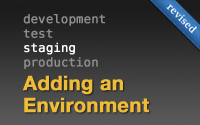#72 Adding an Environment (revised)
Jan 19, 2012 | 4 minutes |
Rails comes with three environments: development, test, and production, but it is easy to add your own. Here I show how to add a separate staging environment and how to start up Rails under this.



Is there a convenient way to separate view and controller logic depending on the environment? I have, for example, a "demo" environment which limits some of the functionality of the app. In result, I have many snippets like
and a corresponding conditional in the controller (+ some modified models – but I don't think, there is a way around different behavior, is it?), which is some kind of messy, especially if only some fields are going to be unchangeable in the demo environment.
Maybe CanCan 2.0 could be a solution, since then the "demo abilities" are more or less centralized... But: would that be the right way?
—Dominik
wouldn't the rollout railscast help here? rollout & degrade
That also crossed my mind, but in this case it basically adds complexity. Instead of a
Rails.env.demo?, I would have arollout?helper call and an overhead through the feature set management (the demo-abilities won't change over time)I've also thought of a custom form builder to shrink down the view overhead—but then I still need a comfortable way to define the accessibility restrictions…
—Dominik
What you can do is set config.rollout in your env file and then use
App::Application.config.rollout.For something more elaborated like
App::Application.rollout?, you can create your own mixin and have method_missing verifying the actual variable.What about separating into partials and then:
<%= render "myview_#{Rails.env}" %>Then have the following partials:
myview_demo
myview_production
etc...
When i had a new environment staging, i have some issues with my dependencies.
im using rails 3.2.1, with bundler 1.0
when i running
$> rails c staging
i m getting this error
/home/regis/RubymineProjects/bb-rails3/config/initializers/devise.rb:3:in `': uninitialized constant Devise (NameError)
But with
$> rails c development (no issue)
$> rails c production (no issue)
I found a trick, if i put in my application.rb
require 'devise'
require 'cancan'
require 'rails_config'
All the errors disappear why im doing wrong ?
Oki my bad i found the solution in my Gemfile.
i forgot to add the new environment "staging" in the group where i declare all the gems i was using.
group :development, :test, :staging, :production do
gem 'will_paginate', '3.0'
gem 'devise', '1.5.3'
gem 'cancan', '1.6.7'
end
I hope it will help
Adding separate env for staging looks like not a good idea, because it will differ from real production. BTW you can use special service for stages https://teatro.io/ that will automate the whole process.
Is there a convenient way to separate view and controller logic depending on the environment?